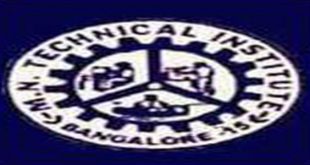Government Polytechnic, Bellary is a premier technical institute of Karnataka state situated in the mining city of Bellary. Government Polytechnic, Bellary is a technical institute offering three years diploma courses. The institute is under the control of Dept. of Technical Education, Govt. of Karnataka.
The institution is an oldest technical institute in the field of technical education. The institute was established in the year 1937, by the name Government Industrial School, under Madras province of India. Later on, it was designated as Rayalaseema Polytechnic and afterward, during 1953 it was renamed as Govt. Polytechnic, Bellary.
Government Polytechnic, Bellary is currently being offered in the following departments.
| SI.No |
Courses |
Intake |
|
1 |
Diploma in Automobile Engineering |
NA |
|
2 |
Diploma in Civil Engineering |
NA |
|
3 |
Diploma in Computer Science Engineering |
NA |
|
4 |
Diploma in Electrical & Electronics Engineering |
NA |
|
5 |
Diploma in Electronics & Communication Engineering |
NA |
|
6 |
Diploma in Mechanical Engineering |
NA |
|
7 |
Diploma in Metallurgical Engineering |
NA |
|
8 |
Diploma in Industrial Safety And Engineering |
NA |
Government Polytechnic, Bellary
Hostel
The Government Polytechnic hostel for boys and girls consists of two blocks, one each for boys and girls. All community areas like the dining hall, common room, reading room, recreation room, washrooms, stores, kitchen etc., are provided separately for boys and girls.
The hostel committee, under the chairmanship of principal and warden who is a full-time lecturer of the Polytechnic, sets the rules and regulations of the hostel from time to time and is the final authority in matters concerning the management of the hostels.
Every month two students from senior class are selected on a rotation basis to work as perfect and to assist in hostel management. The fee structure for the hostel is as per government norms and conditions. The monthly expenditure for mess facilities is calculated on the dividing system and is borne by the inmates of the hostel. At present, there are 37 students staying in the Hostel.
Library :
The library of Govt. Polytechnic, Bellary is a knowledge center with a vision to serve information needs of its students and faculty.
Main Objectives of the library are —
- To serve as the hub of Learning.
- Library as a key player in the integration of subjects themes across the curriculum.
- To act as the gateway of knowledge and invention that exist in print and digital formats.
- Updating and improving library information management system.
It has a good collection of more than 15000 volumes covering all branches of Science and Engineering. The library is equipped with textbooks, reference books, encyclopedias, dictionaries, handbooks, data books etc. In addition, the library has subscribed to 3 newspapers and 5 magazines to meet the general requirements of its users. The library also has seating arrangements for its users to read books and prepare notes.
Students are provided with two library cards for borrowing books. Books are issued to the students on presentation of library cards for a period of 14 days. If the books are lost, then the borrower should replace the books of the same edition or latest edition or pay double the cost of the book after getting permission from the librarian.
National Cadet Corps (NCC)
Motto of NCC: Unity and Discipline
National Cadet Corps, is a premier youth organization, functioning under the Indian Armed Forces. It is channelizing the youth energy in constructive work of our nation and molding the character of the students at the crucial adolescent period.
NCC company army wing of our institution was established in the year 1965. In the beginning, the wing was functioning under 1 KAR Engineering Battalion and was consisting of 50 cadets. Later, in the year 1970, the wing was shifted to 15 KAR Battalion. It was the first wing formed under 15 KAR Battalion.
In the year 1986, the NCC wing of our institution was shifted to 14 KAR Battalion NCC under Mysore group and the cadets’ strength was enhanced from 50 to 150 (of which 30% are women).
Over the past 48 years, more than 3000 cadets of our institution have undergone NCC training and about 6 cadets have represented Karnataka in the INDIAN REPUBLIC DAY PARADE at Delhi.
Today we find students of our institution with NCC background occupying the position of responsibility in the various walks of life and discharging their duties with better efficiency. This itself is a great tribute to the excellent work being done by the NCC wing of our Polytechnic.
In the year 2012-13, ninety-two cadets of NCC wing of our institution had appeared for ‘C’ certificate examinations. All the cadets have qualified and eight of them have passed with ALPHA grade.
National Service Scheme (NSS)
National Service Scheme, under the Ministry of Youth Affairs & Sports, Govt. of India, popularly known as NSS was launched in Gandhiji’s birth centenary year 1969, in 37 universities involving 40,000 students with primary focus on the development of personality of students through community service. Today, NSS has more than 3.2 million student volunteers on its roll spread over 298 universities and 42 (+2) Senior Secondary Councils and Directorate of Vocational Education all over the country. From its inception, more than 3.75 crores students from Universities, Colleges and Institutions of higher learning have benefited from the NSS activities, as student volunteers.
Motto:
The motto of NSS: “NOT ME NOT YOU, BUT WE”. This reflects the essence of democratic living and upholds the need for selfless service.
The main motives of NSS are to:
- Understand the community in which they work
- Understand themselves in relation to their community
- Identify the needs and problems of the community and involve them in the problem-solving process
- Develop among themselves a sense of social and civic responsibility
- Utilize their knowledge in finding a practical solution to individual and community problems
- Develop competence required for group living and sharing of responsibilities
- Gain skills in mobilizing community participation
- Acquire leadership qualities and democratic attitude
- Develop the capacity to meet emergencies and natural disasters
- Practice national integration and social harmony
The Directorate of Technical Education introduced this scheme in all Polytechnics in the year 1998. In Govt. CPC Polytechnic, the first NSS unit having 100 student volunteers was established in the year 1999. An additional unit of 100 student volunteers was introduced in the following year.
In each academic year, many service-oriented programmes are organized by the NSS unit of our institution under the guidelines of NSS cell, DTE, Bangalore. These programmes include:
- Maintenance of roads
- Literacy classes
- Water conservation
- Plastic eradication
- Eye donation
- Tree plantation
- Blood donation
- Campus cleaning
These programmes aim to inculcate social welfare in students and provide services to the society without bias. NSS volunteers work to ensure that everyone who is needy gets help to enhance their standard of living and lead a life of dignity. In doing so, volunteers learn from people in villages how to lead a good life despite a scarcity of resources. NSS also provides help in natural and man-made disasters by providing food, clothing and first aid to the disaster victims.
ISTE
ISTE Student Chapter
The Indian Society for Technical Education is a national, professional, non-profit making society registered under the Societies Registration Act of 1860. The major motives of the ISTE are to assist and contribute in the production and development of top quality professional engineers and technicians needed by the industries and other organizations. Being the only national organization of educators in the field of engineering and technology, ISTE effectively contributes to various missions of the Union Government. The Ministry of Human Resource Development, CTE/DST/MIT/State Governments are well associated with the ISTE for programs relating to technical education.
The major motives of the ISTE are:
- To formulate the general goals & responsibilities of technical education.
- To adjust curriculum & educational processes to changing conditions.
- To develop effective teachers & educational administrators.
- To improve instructional methods & practices & administrative usages.
- To enhance professional ideals & standards.
- To foster research as a function complementary to teaching.
- To cultivate fraternal spirit amongst the teachers, administrators, industrialists & professionals.
- To bring about effective age between technical institutions, industry & society.
- To award honorary fellowships, awards and prizes, for furthering the motives of Technical Education.
ISTE Students Chapter at Govt. CPC Polytechnic was established in the academic year 1996-97 to encourage the students to actively participate in ISTE activities and to enhance their technical knowledge in building their career.
ISTE Student Chapter Activities
- Organizing students symposiums and seminars
- Organizing lectures by experts from industry, R&D organizations, defence services, government departments and other institutions.
- Coaching program for writing competitive examinations and attending the job interview.
- Supervisory and communication skill development
- Training for self-employment
- Guidance on job opportunities in India and abroad
- Arranging training in industries and visits to industry
- Awareness on social, cultural and ethical values and norms
- Special Coaching and General counseling services
CCTEK
CENTRE FOR CONTINUING TECHNICAL EDUCATION IN KARNATAKA (CCTEK)
It is a project sponsored by Department of Technical Education, Government of Karnataka.
The main motives of CCTEK are:
- Continuous sharing of technical know-how and skill with industries and public.
- Imparting technical knowledge, efficiency and professional skills.
- Regeneration of fund for self-sustainability.
- Refresh and revision of curricula & faculty development to meet the present scenario.
Through CCTEK formal & non-formal training programmes, seminars, workshops were conducted to needy people with bare minimum fees and under no profit no loss basis.
“Heartly sharing Knowledge induce development”.
SCHEME OF COMMUNITY DEVELOPMENT THROUGH POLYTECHNICS (CDTP)
Sponsored by Ministry of Human Resource Development, Govt. of India, New Delhi.
In our polytechnic, Community Polytechnic Scheme (CPS) was started in the year 1979, and later it was re-named as Community Development Through Polytechnic Scheme (CDTPS) in your 2009. From this scheme skill, development training is being provided to the rural areas as well as urban areas students. Maximum numbers of trainees have got placement, self-employment and wages.
Several government and non-government agencies have been engaged in the task of rural development since Independence. A huge investment in terms of men, material and capital has gone into a variety of community development programmes. But it has not been able to make any significant dent on the formidable problems of poverty and unemployment. This state of affairs has been the cause of considerable concern to our planners, techno crafts and administrators at the national level.
Even with huge resources and infrastructure, the government agencies have made little impact in rural development work and the success achieved is not commensurate with the efforts put in. This indicates that there some missings or gaps between the first step of initiating the project and the last step of achieving the results.
Role of polytechnic in rural development:
In this context, it was felt that the involvement of the polytechnic in the rural development would go a long way to supply these missings.
Polytechnics could render vital assistance by proving the missings in the rural development work. This they could do by drawing on their own resources or from the resources available around their institutions. The involvement of polytechnics in the total development efforts in the rural reconstruction appears to be inevitable.
Earlier experience in some places had shown that the polytechnics had a tremendous potential which needs harnessing to bring about socio-economic transformation in our rural areas.
Motives of the scheme of CDTP is presented below:
- To carry out need assessment surveys to assess the technology and training needs.
- To impart Skill Development Training to the intended target groups.
- To disseminate appropriate technologies for productivity enhancement.
- To provide technical and support services to rural masses and slums dwellers
- To create awareness among the target groups about technological advancement and contemporary issues of importance.
Major activities of the scheme of CDTP:
Following are the major activities identified under the Scheme of Community Development Through Polytechnics (CDTP).
- Need assessment surveys
- Skill development training programmes
- Disseminate and application of appropriate technologies
- Technical and support services
- Awareness programmes
In order to deliver the benefits of the scheme at the doorsteps of the rural people living nearer to the polytechnics, each identified polytechnic implementing the Scheme of Community Development Through Polytechnics are establishing 5 to 10 village Extension Centres in the model village so that each center covers at least a cluster of 10-20 villages.
These centers act as an extension arm of the polytechnic and provide skill training, repair and maintenance services and common facility for group enterprises, information sharing and hiring technical facilities of the polytechnics. NGO’s Professional Experts, Village Agencies like Panchayats Samitis, Educational Institutions are also included in the establishment of Extension Centres.
Government Polytechnic
Hospet Road, Fort
Bellary – 583102
Karnataka
Contact no.: 08392 – 242228 / 242195
Email: gptb104@rediffmail.com
Website: http://dte.karnataka.gov.in/Institutes/gptbellary/
 Courses and Colleges after 10th After 10th, What Next?
Courses and Colleges after 10th After 10th, What Next?







